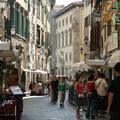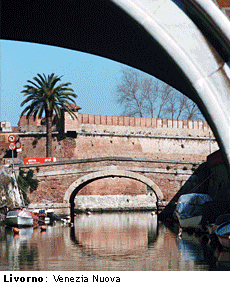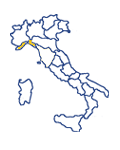Thursday, 25 April 24 - 10:59 pm
 |
|

 |
|
|
|
|


Reserve Livorno Hotels: save up 70% on rooms!
Compare offers & book on line at hotel's web sites. |
|

|
|
Livorno & Etruscan Coast Guide Italy
History and culture
|
|
|
|
|
History and culture
The origins of present day Livorno date back to the 15th century. A small port called Liburna existed in Roman times, built from a natural cove, which was under the domination of Pisa for all of the Middle Ages. A 1017 document mentions the presence of a castle named Livorna.
In 1421 the small port, under the reign of Genoa, was sold to Florence, at that time undergoing major expansion and needing an efficient outlet at the sea. From this time on Livorno was ruled by the Medici family who for more than three centuries transformed the small village into one of the most important ports of the Mediterranean. At the end of the 16th century Francesco I assigned Buontalenti with the task of making Livorno a full-fledged city and he made it able to house 20,000 people inside the walls and 300 ships in the port.
In 1606 Ferdinando I presented Livorno with the "Costituzione Livornina", which gave incentives and privileges to merchants from everywhere who moved to the city to work. Thus the foreign communities, called "Nazioni" flourished; primarily Jews, who lived here free from the humiliation of a ghetto, but also Greeks, Armenians, English, French, Dutch, Spaniards, Portuguese, Russians, Muslims and Waldensians. Many remains can still be seen of this old cosmopolitan city: the various churches of the Nazioni, cemeteries, cuisine and obviously Livorno's inhabitants. Livorno was declared a free port, where goods were completely exempt from taxes. In 1629 Ferdinando II had a new quarter built by Venetian masters which connected the 23 islands by bridges: this quarter is now called Venezia Nuova. The year 1736 marked the end of the Medici dynasty and the rise of the Grand Dukes of Lorraine, connected to Austria's's Hapsburgs. The city began to expand outside the Medici walls, slowly losing its city-fortress appearance.
The 19th century was, after the 17th century, the city's golden century, a time of a great drive of the economy, arts, publishing and culture. Many important public works were built like the Aqueduct of Colognole and Cisternone, which brought and purified water from the inland hills; the Molo Nuovo, train station and new city walls were constructed at the same time. The bathing concessions also rose at the same time, making Livorno one of the major vacation centers for Italians. The seaside promenade is still one of the prettiest areas of the city. Livorno became part of the united Italy in 1860. The suppression of the free port marked the transformation of the economy from maritime to industrial. Livorno was seriously damaged during the Second World War and is currently trying to recover its past role as cultural and tourism leader.
Go to directories of the Web Sites
Photos courtesy of: APT Costa degli Etruschi and Comune di Livorno
|
|
|
|
|
Acquista la tua visibilità su Travel Plan
|
|
|
|





